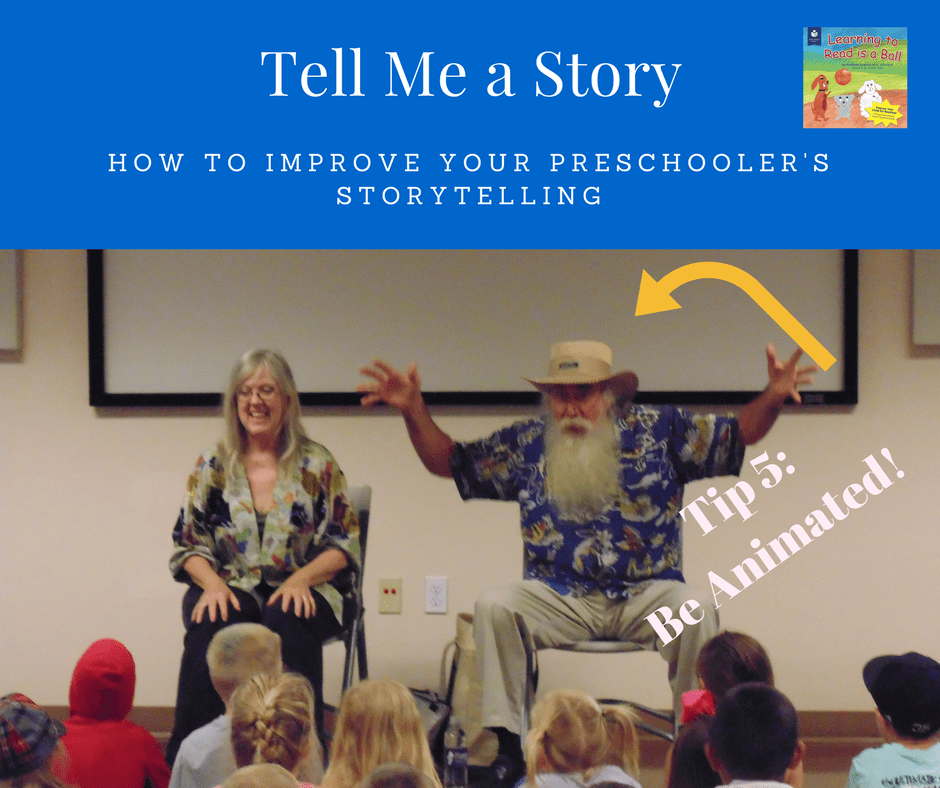Sign Up For Our E-Blast To Receive Information on our Books, Speech Therapy materials and our latest freebies!
Tell Me a Story: 6 Ways to Improve Your Preschooler’s Storytelling

Photo Credit: Pioneer Library System
Being able to tell a story is particularly important for preschoolers and young school age children because oral narratives are associated with academic achievement. Research repeatedly shows that narrative competence by age 5 is highly predictive of future reading comprehension.
Amazon affiliate links have been included.
Here are 6 Ways to Improve Your Preschooler’s Ability to Tell a Story:
- Practice re-telling personal stories.
- Encourage your child to retell his or her personal stories to other family members and friends. These personal narratives are known as recounts. Effectively recounting a personal event or experience is particularly important in young children because such narratives compose a large majority of typical conversations in this age group. Start with having your child practice telling stories about her day, a trip, an event, etc.
- Create an atmosphere of dynamic storytelling!
- Telling a great story takes skill. When someone tells a captivating story, everyone wants to listen. Therefore, tell entertaining stories to your children. My daughter loves when I make up “spooky” stories. Give your children the opportunity to listen to great stories too. Bring them to circle time at the library or to a local bookstore and or to a children’s theatre. Listening to audiobooks (Magic Tree House Collection
or Berenstain Bear’s Stories CD
) during a long drive is also a wonderful option.
- Telling a great story takes skill. When someone tells a captivating story, everyone wants to listen. Therefore, tell entertaining stories to your children. My daughter loves when I make up “spooky” stories. Give your children the opportunity to listen to great stories too. Bring them to circle time at the library or to a local bookstore and or to a children’s theatre. Listening to audiobooks (Magic Tree House Collection
- Promote the use cohesive devices.
- Words like “First”, “Next”, “Then”, and “Finally” link sentences together to tell an organized and cohesive story. Another favorite to begin a story is “Once upon a time…”
- Be animated!
- Have your child vary his facial expressions, use gestures, and change vocal patterns (e.g. whisper, shout, and pout) when telling or acting out the story. Urge him to appeal to the 5 senses.
- Use props or visual supports.
- Encourage your child to use props (e.g. stuffed animals, puppets, dolls) or pictures (e.g. photo albums) or story maps (click here to learn more) to tell a story. I especially like to use props and visuals after reading a classic like, The Three Little Pigs, Goldilocks and the Three Bears,
and Gingerbread Man.
- Encourage your child to use props (e.g. stuffed animals, puppets, dolls) or pictures (e.g. photo albums) or story maps (click here to learn more) to tell a story. I especially like to use props and visuals after reading a classic like, The Three Little Pigs, Goldilocks and the Three Bears,
6. Listen to your child’s story, and then ask questions.
- Put down your phone, close your laptop, shut off the television. Listen to the story that’s about to unfold. Ask questions after your child is finished OR when you find he needs assistance.
For more tips and suggestions on how to develop literacy skills in your child please click here.
Kimberly Scanlon, M.A. CCC-SLP is a speech language pathologist, an author and a mother. As the owner of Scanlon Speech Therapy, LLC, a unique boutique practice in Bergen County, Kimberly embraces individuality and treats the whole person. Her goal is to spread compassion, hope, and some speech, language and literacy tips one moment, one person at a time. Her first book, My Toddler Talks: Strategies and Activities to Promote Your Child’s Language Development and her second book, Learning to Read is a Ball are available for purchase online at Amazon and Barnes and Noble.
Back to blog

